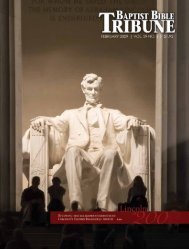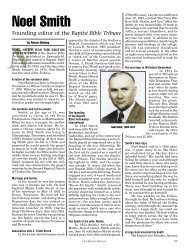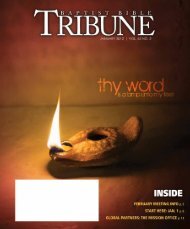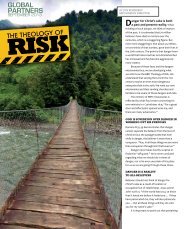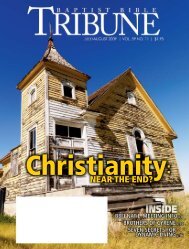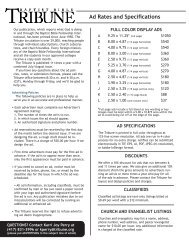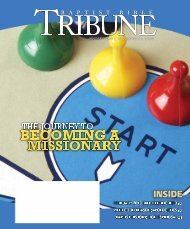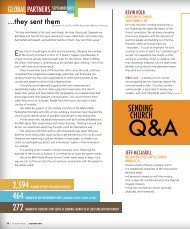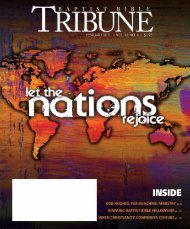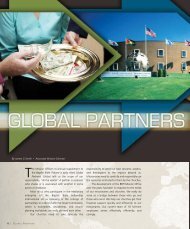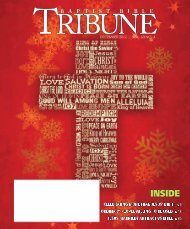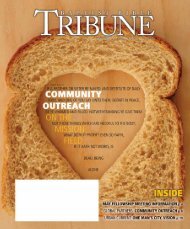O - Baptist Bible Tribune
O - Baptist Bible Tribune
O - Baptist Bible Tribune
Create successful ePaper yourself
Turn your PDF publications into a flip-book with our unique Google optimized e-Paper software.
their way, the English crown itself might be imperiled.<br />
Not surprisingly, the Puritans were outnumbered at the<br />
conference nineteen to four. Bancroft had won the day<br />
and the conference was heavily weighted toward the established<br />
Church. In fact, the four Puritans invited to<br />
the conference were not even admitted to the sessions<br />
until the second day, and then were ridiculed by the King<br />
and bullied into silence. Overruling almost all of their<br />
objections, he told them he would tolerate none of their<br />
nonconformity. He would “make them conform or harry<br />
(harass) them out of the land.” 7<br />
But all was not lost by the Puritans. A suggestion<br />
made on the second day of the Conference by Reynolds<br />
that a new translation of the <strong>Bible</strong> was needed<br />
that would be acceptable to all factions in the Church<br />
of England found favor with the new King. One of the<br />
principal complaints of the time was which <strong>Bible</strong> should<br />
be the standard text to use in both worship and private<br />
study. Three different versions were in circulation in the<br />
early seventeenth century, each with a loyal following,<br />
and each causing sharp dissent among religious parties<br />
in England. The two authorized versions of the Church<br />
of England, the Bishops’ and the Great <strong>Bible</strong><br />
were preferred by the clergy, although the<br />
latter was losing ground to the newer Bishops’<br />
<strong>Bible</strong>. Some of the laity, however, still<br />
clung to the Great <strong>Bible</strong>. The Geneva <strong>Bible</strong><br />
was the favorite of the masses of Englishmen<br />
as well as the Puritan leaders in the Church<br />
of England. The Geneva was a superior translation<br />
but not authorized by the Church, and<br />
its Calvinistic notes offended the more conservative<br />
church leaders.<br />
Flattered by the suggestion of a new<br />
translation, and ruminating over the legacy<br />
that might accrue to him as a result, James<br />
promptly expressed his approval. A lover of Scriptural<br />
quotation and disputation, the king had earlier written<br />
a Paraphrase upon the Revelation of St. John, and had<br />
translated the Psalms into meter. 8 Aware of the influence<br />
of the Geneva <strong>Bible</strong> on the King in his youthful days in<br />
Scotland, Reynolds may have secretly hoped he would<br />
declare the Geneva <strong>Bible</strong> the new Authorized Version,<br />
or at least a revised edition of it. But this was not to be.<br />
James made it clear he didn’t like any of the previous<br />
English <strong>Bible</strong>s, especially the Geneva. “I profess,” he said,<br />
“I could never yet see a <strong>Bible</strong> well translated in English;<br />
but I think, that of all, that of Geneva is the worst.” 9 The<br />
King’s attack on the Geneva <strong>Bible</strong> no doubt came as a<br />
surprise to the Puritans, since it was the first <strong>Bible</strong> ever<br />
published in Scotland, was dedicated to James in 1579,<br />
and the version he quoted from in his own writings. 10<br />
In truth, his objection was not so much to the translation<br />
itself but to the marginal notes that seemed to<br />
contradict his cherished belief in the “divine right of<br />
kings.” “For in the Geneva translation,” he complained,<br />
“some notes are partial, untrue, seditious, and savouring<br />
of traitorous conceits,” and he instanced Exodus 1:19<br />
and II Chronicles 15:16. 11 The marginal note for Exodus<br />
1:19 commends the Hebrew midwives for disobeying the<br />
Egyptian king’s orders. The note for II Chronicles 15:16<br />
states that King Asa’s mother should have been executed,<br />
and not merely deposed, for her idolatry. “It is supposed<br />
that James’ suspicious mind thought that this might react<br />
unfavorably upon the memory of his own mother, Mary<br />
Queen of Scots.” 12 Such notes insinuating that disobedience<br />
to kings was lawful, James considered seditious. As<br />
a strong proponent of the divine right of kings, James<br />
would use his kingly power to keep the Geneva from becoming<br />
the new Authorized Version.<br />
Though the King liked the idea of a new translation,<br />
his enthusiasm was not shared by all the clerics present<br />
at the Conference. Bishop Richard Bancroft complained,<br />
“If every man’s humour should be followed, there would<br />
be no end of translating.” 13 But when he saw that the king<br />
agreed with Reynolds, Bancroft gradually warmed to the<br />
project and eventually gave his wholehearted allegiance<br />
to it.<br />
Strategy for the New Revision<br />
The strategy for the development of the new revision<br />
was meticulously planned and executed. James ordered<br />
in February, 1604, that the work “be done by the best<br />
learned in both Universities, after them to be presented<br />
to the Privy Council; and lastly to be ratified by his Royal<br />
authority, and so this whole Church to be bound unto<br />
The fact that the<br />
Geneva <strong>Bible</strong><br />
deemed the Hebrew<br />
midwives<br />
“lawful” in their<br />
disobedience of<br />
the authority of<br />
the land did not sit<br />
well with James I.<br />
March 2011 | <strong>Baptist</strong> <strong>Bible</strong> <strong>Tribune</strong> | 9



